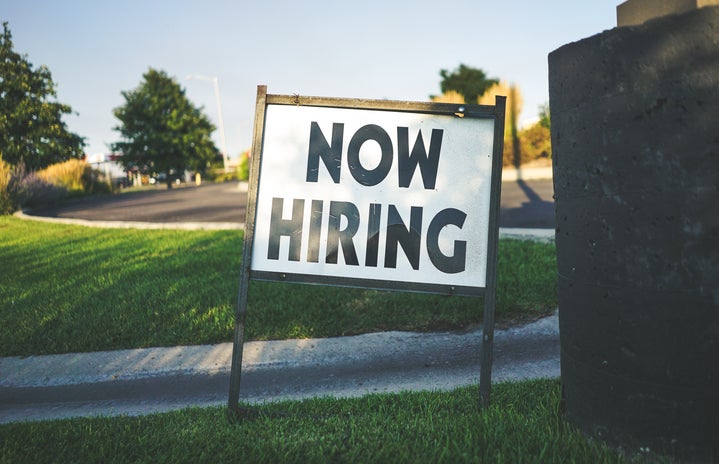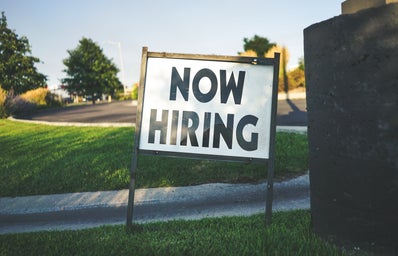With midterm season well underway, it’s impossible to ignore the fact that fall semester will be over before you know it. With the arrival of spring semester comes the deadline for internship and job applications, so you’re beyond thrilled that there’s a Career Fair coming up to help you figure out where you’ll be working next summer or after graduation. Meeting prospective employers and networking to get the job of your dreams is an imperative step in your college life. So how do you make sure that you do it right?
Preparation
What to Wear
Sure, you have a knee-length body-con skirt and a chiffon button-down shirt that worked for that Corporate-themed party you went to last Saturday, but do you have the right clothes for the career fair?
Stephanie Girouard, a staff assistant in the Internship and Career Placement Office at the Penn State College of Communications, offers her input on what you should wear. “Women should wear a top, a skirt or dress pants, and a blazer. The blazer and bottom of choice don’t have to be a suit but should coordinate with one another and fit appropriately,” Girouard says, adding, “All items should be pressed.”
So that outfit that you wore to the theme party would work, right? Wrong. Girouard continues, “If you have to constantly adjust and fidget, it does not fit nor is it appropriate to wear to a career fair. Shirts should not gap at the bustline; skirts should not be mid-thigh when you sit down.” So make sure that your skirt as at least knee-length. You should also make sure that the clothes are of a professional material, nothing stretchy or casual-looking.
Girouard offers one last golden nugget of advice on what to wear: “Shoes should be comfortable to walk in, because you will be on your feet for a long time.”
What to Do
The first thing that you need to find out is which companies will be attending the career fair. That way you know your audience! Research which potential employers will be there so that you know who you’re going to be dealing with.
Colette Rodger, the Manager of Internships in the Penn State College of Communications, says, “For the career fairs that we hold, we send out e-mails with a list of all companies attending. Students can also stop in our office, where there will be a list of all companies attending. The days of the events, we always offer a booklet for all attendees. It will include all of the companies, all the recruiters in attendance, their contact information, and jobs or internships that they are searching for.”
Bob Martin, the Assistant Dean for Internships and Career Placement at the Penn State College of Communications, says that the preparation process should expand further than that. “Know your audience,” Martin says, “but also know yourself and how your skills, knowledge, and experience match up with what employers are looking for with the particular positions they have available.”
After you’ve explored the companies that will be present and the positions that each company has available, select the companies that you want to see and make a list of your top priorities.
Rodger suggests learning a bit about the companies that you select before attending the Career Fair. “Be sure to do your homework on the companies you want to meet with,” says Rodger. “What if you went up to FOX and they asked you, out of the blue, ‘What is your favorite FOX show?’ Ugh, that could be scary if you were put on the spot and you didn’t do your homework!”
Once you know a bit about your top choices, prepare a miniature presentation about yourself and your skill set to share with the potential employers you’ll meet at the fair. “Get your 1-minute elevator pitch down,” says Martin. “You should be prepared to present yourself in a professional, positive manner and show them why you are an exceptional candidate.”
These people see thousands of students a day, so work on figuring out what makes you stand out from the crowd. “Try to provide them with three things that you believe uniquely qualify you,” Martin says. “Be sure those points are part of your discussion. In other words, you must create value!”
What to Bring
Of course you know that you need to bring along copies of your resume. Rodger says, “Take more resumes with you than you expect. If you want to speak with ten recruiters, take fifteen resumes with you.”
“Be prepared with materials to present,” Rodger continues. “They usually want to see your work. If you are searching for newspapers, you would like to write, and you have previous experience in the business, bring your samples by photocopying your original clips and stapling them together. If you are a broadcasting student looking for anchor positions, bring a DVD or your laptop to show them your work. If you do not have samples of your work to give out, have a link to your e-portfolio on your resume.”
It’s also a good idea to bring along a (professional-looking and appropriate) bag with you at the fair. Something in a neutral tone, without studs or sparkles all over it, would be fine. This way you have something to carry your own materials in so that you have a free hand to shake theirs with, and you have somewhere to put all of the pamphlets, informational sheets, and business cards you collect from all of the companies throughout the duration of the day.
Once You’re There
Where to Go
So you’re dressed to impress and you’ve brought along copies of your resume and samples of your work. You finally arrive at the Career Fair… and it’s an overwhelming mass of stands for hundreds of different companies. Don’t hyperventilate! Here’s how you handle it.
“If you get to the event when it opens, move in a counter-clockwise direction if the crowd flow is going in a clock-wise direction,” Martin advises. “This way, you’ll get to see recruiters before others, and you won’t have to wait in long lines.”
“Make sure you pursue them in a fashion that won’t waste your time,” Martin emphasizes. “In other words, don’t zig-zag across an entire room and wait in long lines.”
How to Network
Girouard suggests taking a few minutes to shake off your nerves. “In other words, don’t go to your top recruiters first,” Girouard says. “Visit with a few companies that you have interest in, but which are not in your top tier. This allows you to become more comfortable with the networking process. Once your nerves have settled, then go to see your top choices.”
Once you get to your top choices, make the right first impression! “As you introduce yourself, make sure to provide confident, positive eye contact and smile,” Martin says. “Give a good professional handshake.”
Then it’s time to give them that 1-minute elevator pitch that you practiced! “Introduce yourself,” says Martin. “Share with them your interest in the position, and explain why you are enthusiastically interested. Tell them what you believe makes you an ideal candidate for the position. Share with them three things that uniquely qualify you for the position. That way, if your conversation is very brief, at least you created impact in the short time you had with them.”
“If you have the opportunity to expand on your conversation, you can then provide support to the three elements that you stated uniquely qualify you,” Martin adds. “Tailor your skills and interests to the specific position you’re talking about whenever possible.”
If it’s a company that you’re interested in, rather than a specific position within that company, don’t freak out! “If you are interested in working for a certain company and not a specific position, I would share with them why you are so enthusiastic about working for them,” Martin advises. “Show them that you truly did your research and identify how it correlates to why you are so passionate about their company. I would still recommend that you focus on a particular area of their company that interests you—for example, Corporate Communications if it is a company like GE.”
When your minute is up, don’t stand around wasting the employer’s time. “Close by letting re-iterating your three key traits that make you a qualified candidate,” Martin says. “Show sincere interest for the position and thank them for their time.”
Offer the employer your resume, some of your sample work, and one more professional handshake with a smile, and move on to the next company. But before you walk away, make sure to ask for a business card! If they don’t have one, politely ask for their contact information; most employers are happy to provide you with it.
Following Up
You came, you saw, you schmoozed… Now what? First of all, make sure that you reach out to the employers that you spoke with at the fair. “I always suggest e-mailing the recruiters that you spoke with,” Rodger says. “Be sure to include some of the information that you spoke to them about so that they can remember which student you are. If you spoke about something that set you apart from anyone else, be sure to include that as well.”
Most Importantly
Throughout this whole process, the most important thing to remember is to be confident! People can sense if you’re trying to sell a product you don’t believe in, and this goes double for prospective employers, especially when the product you’re selling is you. Make direct eye contact, maintain good posture, and speak proudly about your skills and experience. Let your personality shine through! That’s what employers are looking for.

